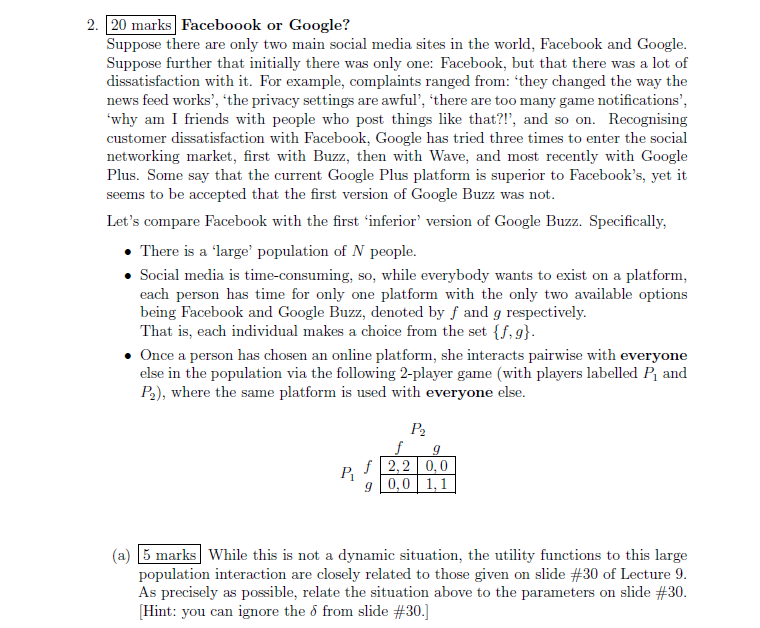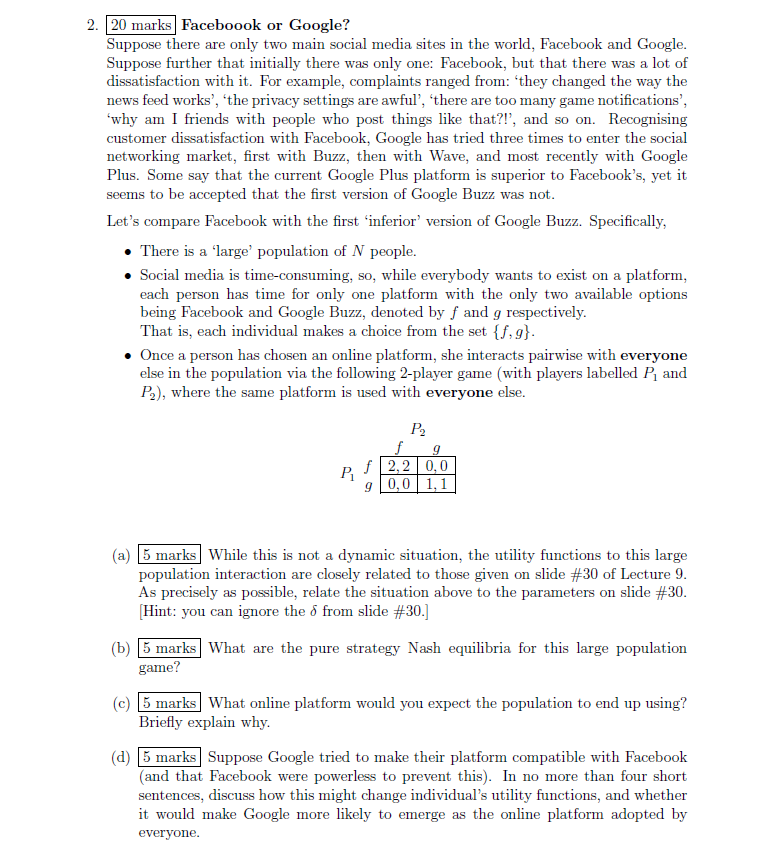

2. 20 marks Faceboook or Google? Suppose there are only two main social media sites in the world, Facebook and Google. Suppose further that initially there was only one: Facebook, but that there was a lot of dissatisfaction with it. For example, complaints ranged from: 'they changed the way the news feed works', 'the privacy settings are awful', 'there are too many game notifications', 'why am I friends with people who post things like that?!', and so on. Recognising customer dissatisfaction with Facebook, Google has tried three times to enter the social networking market, first with Buzz, then with Wave, and most recently with Google Plus. Some say that the current Google Plus platform is superior to Facebook's, yet it seems to be accepted that the first version of Google Buzz was not. Let's compare Facebook with the first 'inferior' version of Google Buzz. Specifically, There is a large population of N people. Social media is time-consuming, so, while everybody wants to exist on a platform, each person has time for only one platform with the only two available options being Facebook and Google Buzz, denoted by f and g respectively. That is, each individual makes a choice from the set {f,g}. Once a person has chosen an online platform, she interacts pairwise with everyone else in the population via the following 2-player game (with players labelled P, and P2), where the same platform is used with everyone else. P2 f 9 f 2,2 0,0 9 0,0 1,1 (a) 5 marks While this is not a dynamic situation, the utility functions to this large population interaction are closely related to those given on slide #30 of Lecture 9. As precisely as possible, relate the situation above to the parameters on slide #30. Hint: you can ignore the 8 from slide #30.] 2. 20 marks Faceboook or Google? Suppose there are only two main social media sites in the world, Facebook and Google. Suppose further that initially there was only one: Facebook, but that there was a lot of dissatisfaction with it. For example, complaints ranged from: 'they changed the way the news feed works', 'the privacy settings are awful', 'there are too many game notifications', 'why am I friends with people who post things like that?!', and so on. Recognising customer dissatisfaction with Facebook, Google has tried three times to enter the social networking market, first with Buzz, then with Wave, and most recently with Google Plus. Some say that the current Google Plus platform is superior to Facebook's, yet it seems to be accepted that the first version of Google Buzz was not. Let's compare Facebook with the first 'inferior' version of Google Buzz. Specifically, There is a large population of N people. Social media is time-consuming, so, while everybody wants to exist on a platform, each person has time for only one platform with the only two available options being Facebook and Google Buzz, denoted by f and g respectively. That is, each individual makes a choice from the set {f,g}. Once a person has chosen an online platform, she interacts pairwise with everyone else in the population via the following 2-player game (with players labelled P, and P2), where the same platform is used with everyone else. P2 f 9 f 2,2 0,0 9 0,0 1,1 (a) 5 marks While this is not a dynamic situation, the utility functions to this large population interaction are closely related to those given on slide #30 of Lecture 9. As precisely as possible, relate the situation above to the parameters on slide #30. Hint: you can ignore the & from slide #30.] (b) 5 marks What are the pure strategy Nash equilibria for this large population game? (c) 5 marks What online platform would you expect the population to end up using? Briefly explain why. (a) 5 marks Suppose Google tried to make their platform compatible with Facebook (and that Facebook were powerless to prevent this). In no more than four short sentences, discuss how this might change individual's utility functions, and whether it would make Google more likely to emerge as the online platform adopted by everyone. 2. 20 marks Faceboook or Google? Suppose there are only two main social media sites in the world, Facebook and Google. Suppose further that initially there was only one: Facebook, but that there was a lot of dissatisfaction with it. For example, complaints ranged from: 'they changed the way the news feed works', 'the privacy settings are awful', 'there are too many game notifications', 'why am I friends with people who post things like that?!', and so on. Recognising customer dissatisfaction with Facebook, Google has tried three times to enter the social networking market, first with Buzz, then with Wave, and most recently with Google Plus. Some say that the current Google Plus platform is superior to Facebook's, yet it seems to be accepted that the first version of Google Buzz was not. Let's compare Facebook with the first 'inferior' version of Google Buzz. Specifically, There is a large population of N people. Social media is time-consuming, so, while everybody wants to exist on a platform, each person has time for only one platform with the only two available options being Facebook and Google Buzz, denoted by f and g respectively. That is, each individual makes a choice from the set {f,g}. Once a person has chosen an online platform, she interacts pairwise with everyone else in the population via the following 2-player game (with players labelled P, and P2), where the same platform is used with everyone else. P2 f 9 f 2,2 0,0 9 0,0 1,1 (a) 5 marks While this is not a dynamic situation, the utility functions to this large population interaction are closely related to those given on slide #30 of Lecture 9. As precisely as possible, relate the situation above to the parameters on slide #30. Hint: you can ignore the 8 from slide #30.] 2. 20 marks Faceboook or Google? Suppose there are only two main social media sites in the world, Facebook and Google. Suppose further that initially there was only one: Facebook, but that there was a lot of dissatisfaction with it. For example, complaints ranged from: 'they changed the way the news feed works', 'the privacy settings are awful', 'there are too many game notifications', 'why am I friends with people who post things like that?!', and so on. Recognising customer dissatisfaction with Facebook, Google has tried three times to enter the social networking market, first with Buzz, then with Wave, and most recently with Google Plus. Some say that the current Google Plus platform is superior to Facebook's, yet it seems to be accepted that the first version of Google Buzz was not. Let's compare Facebook with the first 'inferior' version of Google Buzz. Specifically, There is a large population of N people. Social media is time-consuming, so, while everybody wants to exist on a platform, each person has time for only one platform with the only two available options being Facebook and Google Buzz, denoted by f and g respectively. That is, each individual makes a choice from the set {f,g}. Once a person has chosen an online platform, she interacts pairwise with everyone else in the population via the following 2-player game (with players labelled P, and P2), where the same platform is used with everyone else. P2 f 9 f 2,2 0,0 9 0,0 1,1 (a) 5 marks While this is not a dynamic situation, the utility functions to this large population interaction are closely related to those given on slide #30 of Lecture 9. As precisely as possible, relate the situation above to the parameters on slide #30. Hint: you can ignore the & from slide #30.] (b) 5 marks What are the pure strategy Nash equilibria for this large population game? (c) 5 marks What online platform would you expect the population to end up using? Briefly explain why. (a) 5 marks Suppose Google tried to make their platform compatible with Facebook (and that Facebook were powerless to prevent this). In no more than four short sentences, discuss how this might change individual's utility functions, and whether it would make Google more likely to emerge as the online platform adopted by everyone








